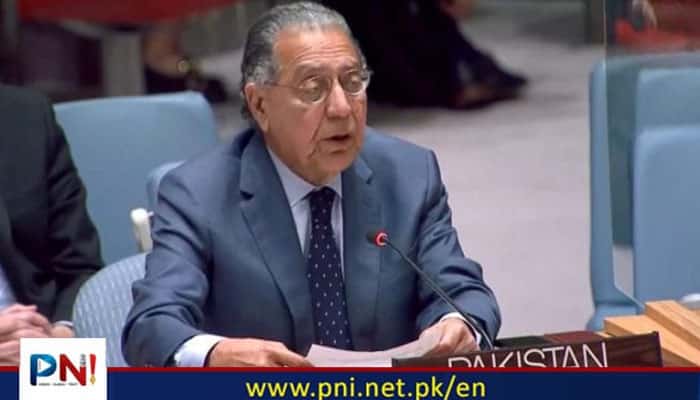UNITED NATIONS, Jun 27 (APP): Highlighting the plight of Children living under foreign occupation, Pakistan on Wednesday criticized the United Nations for ignoring the suffering of Kashmiri children in its report on ‘Children and Armed Conflict’, calling the omission “unjust.”
Speaking in the UN Security Council, which met under South Korea’s presidency, Ambassador Munir Akram said the situation of children in Indian-occupied Jammu and Kashmir had been unjustly omitted this time, despite their ongoing suffering under foreign occupation.
“Generations of Kashmiri children have grown up amidst fear of violence and repression under foreign occupation,” the Pakistani envoy told the 15-member Council.
“The report’s most glaring and persistent failure and double standard has been its selective omission of certain situations, most importantly, the children of Palestine. It has taken the killing of 14,000 children in the (ongoing) Gaza war for Israel to be included in the report (this year).”
Meanwhile, Ambassador Akram added, “the plight of children in Indian-occupied Jammu and Kashmir, previously included in the reports, has been unjustly omitted, despite their ongoing suffering under foreign occupation.
Detailing the plight of children in the occupied territories, where human rights violations are “tragically routine”, the Pakistan envoy said, adding “We vividly recall the heart-wrenching image of a three-year old Kashmiri boy sitting in shock on his grandfather’s lifeless body just murdered by Indian soldier; we remember 18-month-old Hiba, her eyes ruptured by pellet guns fired by security forces inside her home in Kapran village of Kashmir.”
He said that none of the UN High Commissioner for Human Rights and several Special Rapporteurs of the Human Rights Council have, who asked for access to Indian-occupied Jammu and Kashmir to investigate the reports of massive violations of human rights, was allowed to go there.
“I will like to ask the SRSG (Special Representative of the Secretary-General) whether she was able to visit Indian Occupied Kashmir during her visit to India,” Ambassador Akram asked.
“The Special Rapporteur should investigate and report on the whereabouts and condition of the 13,000 Kashmiri youth who were widely reported to have been ‘picked up’ and detained by the occupation forces after 5 August 2019 (when India illegally annexed occupied Kashmir). It was also reported that many of them were tortured to extract ‘confessions’ and deter them and their families from joining the Kashmiri liberation struggle”.
In 2022, he said, Pakistan provided the United Nations a Dossier of 3432 cases of war crimes, including crimes against women and children, committed by senior officers of the Indian occupying forces, with audio and video evidence. “Among these are numerous cases of crimes against Kashmiri children,” he added.
The report last year rightly urged India to implement measures, including the prohibition of the use of lethal and non-lethal force on children, ending the “use of pellet guns” and preventing all forms of ill-treatment of children in detention, and protection of children from sexual offences, he said.
Pakistan, Ambassador Akram added, supported the mandate of the SRSG to deal with situations of children in armed conflict.
However, the Pakistani envoy objected to the references to Pakistan in the Secretary-General’s report, which, he said, are “outside of the mandate of the Special Rapporteur”.
In this regard, he detailed Pakistan’s extensive legal, policy and operational measures to protect children.
Opening the discussion, Victoria Gamba, Special Representative of the Secretary-General for Children and Armed Conflict, presenting the Secretary-General’s annual report on children and armed conflict, said that the information presented today “has been obtained in contexts of great hardship and under incredibly difficult circumstances, during a deadly year for United Nations personnel and aid workers”.
In the 25 countries and one regional situation covered by her mandate, the UN verified 32,990 grave violations against 22,557 children in 2023 — the highest figures in almost 10 years.
Across the globe, “children bore the brunt of multiplying and escalating crises”, she said, adding that they experienced horrific violence in combat zones, displacement camps, urban areas and their homes and schools.
A staggering 5,301 children were killed and another 6,348 maimed or injured in 2023, marking a shocking 35 per cent rise over previous years, she reported.
The use of explosive weapons in densely populated areas, as well as deliberate and indiscriminate attacks against civilians and civilian objects, had a bleak impact on children.
“Whether armed forces or non-State armed groups, all parties to conflict contributed to this deadly harvest,” Ms. Gamba stated.
Palestine’s UN Ambassador Riyadh Mansour expressed profound regret that it took a “genocidal war” against his people to finally add Israel to the “list of shame” this year.
He highlighted the devastating toll in Gaza, where nearly 16,000 Palestinian children were killed and another 21,000 were missing.
Gaza, once a vibrant place where children set world records in sports, has now been reduced to a graveyard.
Ambassador Mansour condemned the erosion of morality witnessed globally during eight months of conflict, as images flooded social media showing Palestinian children starving, injured with severe burns or no limbs, fighting for their lives.
“Where is your humanity?”, he asked, calling for “collective resolve and responsibility to pressure Israel to stop the madness”.
“Enforce a ceasefire now, save our and your humanity now,” the Palestinian envoy added.
The persistent “political appeasement and double standards” made Israel believe it was exempt from the rule of law, he said, dismissing the “lie” about “the Israeli army” as the “most moral army in the world”.
There is nothing moral in using attacks against civilians, including children, as a weapon of war, as a tool for political pressure in negotiations, or a catalyst to stay in power, Ambassador Mansour emphasized.
Follow the PNI Facebook page for the latest news and updates.









